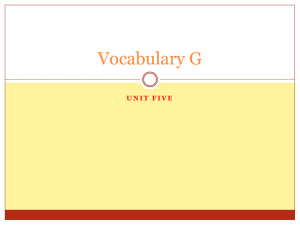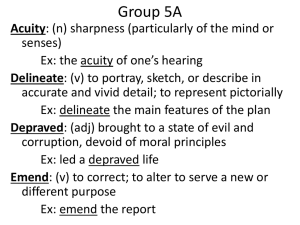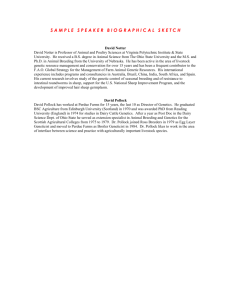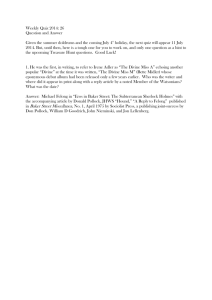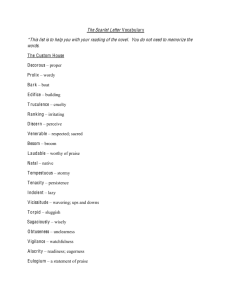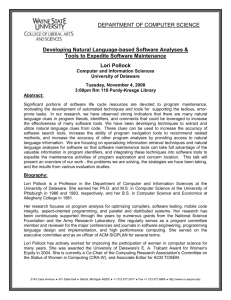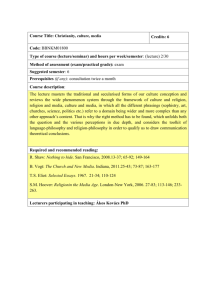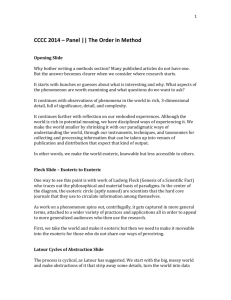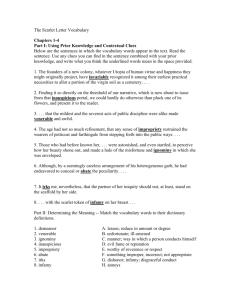Vocabulary Unit #5 – Honors/Gifted
advertisement
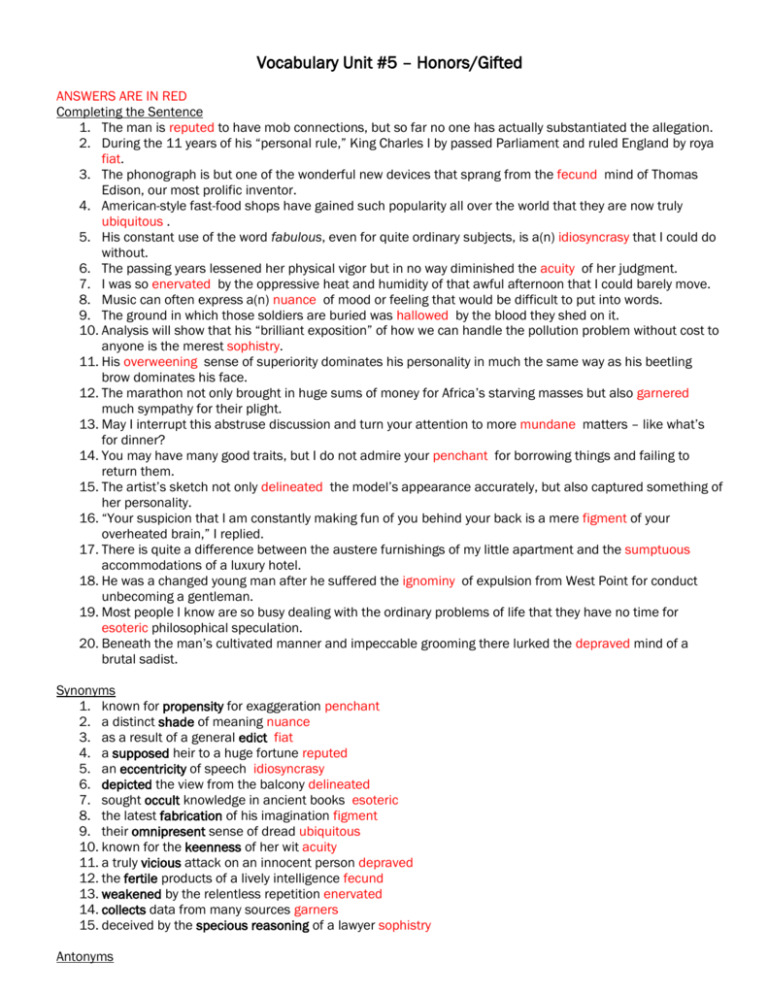
Vocabulary Unit #5 – Honors/Gifted ANSWERS ARE IN RED Completing the Sentence 1. The man is reputed to have mob connections, but so far no one has actually substantiated the allegation. 2. During the 11 years of his “personal rule,” King Charles I by passed Parliament and ruled England by roya fiat. 3. The phonograph is but one of the wonderful new devices that sprang from the fecund mind of Thomas Edison, our most prolific inventor. 4. American-style fast-food shops have gained such popularity all over the world that they are now truly ubiquitous . 5. His constant use of the word fabulous, even for quite ordinary subjects, is a(n) idiosyncrasy that I could do without. 6. The passing years lessened her physical vigor but in no way diminished the acuity of her judgment. 7. I was so enervated by the oppressive heat and humidity of that awful afternoon that I could barely move. 8. Music can often express a(n) nuance of mood or feeling that would be difficult to put into words. 9. The ground in which those soldiers are buried was hallowed by the blood they shed on it. 10. Analysis will show that his “brilliant exposition” of how we can handle the pollution problem without cost to anyone is the merest sophistry. 11. His overweening sense of superiority dominates his personality in much the same way as his beetling brow dominates his face. 12. The marathon not only brought in huge sums of money for Africa’s starving masses but also garnered much sympathy for their plight. 13. May I interrupt this abstruse discussion and turn your attention to more mundane matters – like what’s for dinner? 14. You may have many good traits, but I do not admire your penchant for borrowing things and failing to return them. 15. The artist’s sketch not only delineated the model’s appearance accurately, but also captured something of her personality. 16. “Your suspicion that I am constantly making fun of you behind your back is a mere figment of your overheated brain,” I replied. 17. There is quite a difference between the austere furnishings of my little apartment and the sumptuous accommodations of a luxury hotel. 18. He was a changed young man after he suffered the ignominy of expulsion from West Point for conduct unbecoming a gentleman. 19. Most people I know are so busy dealing with the ordinary problems of life that they have no time for esoteric philosophical speculation. 20. Beneath the man’s cultivated manner and impeccable grooming there lurked the depraved mind of a brutal sadist. Synonyms 1. known for propensity for exaggeration penchant 2. a distinct shade of meaning nuance 3. as a result of a general edict fiat 4. a supposed heir to a huge fortune reputed 5. an eccentricity of speech idiosyncrasy 6. depicted the view from the balcony delineated 7. sought occult knowledge in ancient books esoteric 8. the latest fabrication of his imagination figment 9. their omnipresent sense of dread ubiquitous 10. known for the keenness of her wit acuity 11. a truly vicious attack on an innocent person depraved 12. the fertile products of a lively intelligence fecund 13. weakened by the relentless repetition enervated 14. collects data from many sources garners 15. deceived by the specious reasoning of a lawyer sophistry Antonyms 16. desecrated the tombs of their ancestors hallowed 17. a man of modest aspirations overweening 18. the unworldly side of life mundane 19. made a meager meal sumptuous 20. the glory of her situation ignominy Choosing the Right Word 1. It is only in superior mental powers, not in physical strength or (ignominy, acuity) of the senses, that human beings surpass other living things. 2. Cleopatra took her won life rather than suffer the (figment, ignominy) of being led through the streets of Rome in chains. 3. Like a true fanatic, he considers anyone who disagrees with him on any issue to be either feebleminded or (depraved, mundane). 4. Your language is indeed clever and amusing, but your argument is nothing but a piece of outright (sophistry, idiosyncrasy). 5. In a democracy, the government must rule by persuasion and consent – not by mere (fiat, sophistry). 6. The conversation between the computer programmers was so (esoteric, ubiquitous) that I wasn’t sure whether they were speaking English. 7. Her imagination is like a (fecund, depraved) field in which new ideas spring up like so many ripe ears of corn. 8. In that rarefied atmosphere, I was afraid to ask about anything quite so (sumptuous, mundane) as the location of the john. 9. We will never abandon a cause that has been (garnered, hallowed) by the achievements and sacrifices of so many noble people. 10. Someone with a pronounced (penchant, figment) for saying the wrong thing might justly be described as a victim of “foot-in-the-mouth” disease. 11. I appreciate all those kind expressions of gratitude for my services, but I had hoped also to (garner, nuance) some greenbacks. 12. Probably no complaint of young people is more (ubiquitous, depraved) than “My parents don’t understand me!” 13. Scandal and corruption may so (enervate, delineate) an administration that it can no longer function effectively. 14. He means well, but we cannot tolerate his highly (idiosyncratic, fecund) behavior in an organization that depends on discipline and teamwork. 15. How I’d love to knock the wind out of the sails of that lout’s (fecund, overweening) conceit! 16. Two synonyms are rarely exactly the same because (fiats, nuances) of tone or applicability make each of words unique. 17. The alert defense put up by our team completely neutralized our opponents’ (reputedly, sumptuously) unstoppable passing attack. 18. A true sign of intellectual maturity is the ability to distinguish the (figments, penchants) of wishful thinking from reality. 19. The (sumptuous, ubiquitous) banquet was a pleasant change of pace from the Spartan fare to which I had become accustomed. 20. Few writers have J.D. Salinger’s remarkable ability to (delineate, garner) the emotions and aspirations of the average teenager. Vocabulary in Context Lights! Action! Paint! The age-old aspiration of painters to delineate reality in recognizable forms was consciously abandoned in the United States in the 1940s and 1950s by a group of artists working mostly in New York. The most prominent member of the group was Wyoming-born Jackson Pollock. Other major figures included Willem de Kooning, Mark Rothko, and Barnett Newman. Although critics were quick to lump these painters together under the rather esoteric label Abstract Expressionist, each one had an individual style, ranging from the explosive energy of Pollock’s action paintings to the serene contemplativeness of Rothko’s color field canvasses. Despite each artist’s idiosyncratic technique, the critics continued to point to a set of common practices that marked these painters as members of a distinct movement in modern art. These commonalities included a penchant for working on a huge scale, an interest in the surface qualities and flat plane of the canvas, and a preference for an all-over aesthetic in which no one area of the painting is emphasized over any other. One product of Pollock’s fecund mind, his series of “action paintings” of the 1940s, is a well-known example of these Abstract Expressionist traits. Instead of using the traditional easel and brush, Pollock laid a canvas on the floor and moved around it rhythmically, pouring and dripping paint on it from a can. The utter abstraction and seeming randomness of these revolutionary paintings initially baffled the public, but Pollock did succeed in garnering widespread critical acclaim, public recognition, and considerable financial rewards before his untimely death in a car accident in 1956 at the age of forty-four. 1. The meaning of delineate is a. Heighten b. Deny c. Escape d. Depict 4. Penchant most nearly means a. Propensity b. Reputation c. Weakness d. Dislike 2. Esoteric most nearly means a. cryptic b. kind c. critical d. catchy 5. The meaning of fecund is a. Fertile b. Insightful c. Brilliant d. Expository 3. Idiosyncratic is best defined as a. Excellent b. Similar c. Eccentric d. Delightful 6. Garnering most nearly means a. Belittling b. Acquiring c. Ignoring d. Demanding
